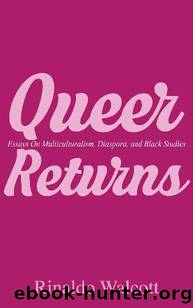Queer Returns: Essays on Multiculturalism, Diaspora, and Black Studies by Rinaldo Walcott

Author:Rinaldo Walcott [Walcott, Rinaldo]
Language: eng
Format: epub
Publisher: Insomniac Press
Published: 2017-03-28T00:00:00+00:00
Chapter 6
Queer Returns: Human Rights,
the Anglo-Caribbean, and Diaspora Politics
This history breeds the need for activating an ethical imperative atrophied by gradual distancing from the narrative of â progress colonialism/ capitalism. This is the argument about cultural suturing, learning from below to supplement with the possibility of the subjectship of rights.1
Introduction: A life in-between position
In the spring of 2008, Thomas Glave published the anthology Our Caribbean: A Gathering of Lesbian and Gay Writing from the Antilles. The book has been greeted with a great deal of enthusiasm, and rightly so; its reception has been hailed as a singularly important moment in the politics and debates of Caribbean non-heterosexual identities and practices. Glave has been meticulous in documenting the responses to the book, which reportedly took him about six years to compile, with some works translated into English for the first time. Our Caribbean is a pan-Caribbean anthology; most of the languages of the region are represented in the book, and it consists of prose fiction alongside critical essays as well as personal essays. For full disclosure, I contributed an essay to the anthology. 2
All authors are given a nation-state designation in the book even if they have not resided in that nation-state for most of their life (for example, Dionne Brand, Trinidad; Makeda Silvera, Jamaica; while some authors are given two or three designations, which seem to be based on the geo-political territory their writing covers, but also hints at nation-state belonging: Walcott, Barbados/Canada; Audre Lorde, Grenada/Barbados/USA, and therein lies the first set of basic difficulties with the work of such an anthology. How does such an anthology negotiate diaspora and in particular second-order diasporas? Despite such difficulties, difficulties that I consider significant even if basic, reviewers have generally glowed about the anthology, mostly seeing it as a very important âcoming out partyâ for Caribbean queers. The book is read as an important plank in the struggle for rights in the region.
For example, Dr. Cathie Koa Dunsford wrote a glowing review of the anthology, calling it must-read material and urging colleagues to take it up as a course text.3 Most importantly, she understands the anthology as taking up Audre Lordeâs work and project and extending it into our present conditions of human existence. Dunsfordâs review champions the anthology as a subaltern truth-telling that brings to the table voices of those not often heard and sometimes never heard. Her one caution is that the anthology would have benefited from more local regional voices â that is, voices in place in the region currently â and fewer âexpats;â in other words, the anthology suffers from the usual problem of those in the diaspora speaking back to âhome.â Dunsfordâs claim points back to the difficulty of how second-order diasporas are placed in such conversations and relations. But still she reminds us that the anthology now sets in place an important foundation for those still living in the region to build on. A kind of developmental model is immediately present in her comments, and yet her comments also point to the difficult politics and ethics of the undertaking tackled by Glave.
Download
This site does not store any files on its server. We only index and link to content provided by other sites. Please contact the content providers to delete copyright contents if any and email us, we'll remove relevant links or contents immediately.
Never by Ken Follett(3924)
Fairy Tale by Stephen King(3361)
Reminders of Him: A Novel by Colleen Hoover(3066)
Will by Will Smith(2894)
It Starts With Us (It Ends with Us #2) by Colleen Hoover(2321)
Friends, Lovers, and the Big Terrible Thing by Matthew Perry(2210)
The Becoming by Nora Roberts(2181)
Cloud Cuckoo Land by Anthony Doerr(2083)
The Strength In Our Scars by Bianca Sparacino(1833)
A Short History of War by Jeremy Black(1829)
Cytonic by Brandon Sanderson(1826)
Go Tell the Bees That I Am Gone by Diana Gabaldon(1745)
A Game of Thrones (The Illustrated Edition) by George R. R. Martin(1702)
515945210 by Unknown(1659)
Kingdom of Ash by Maas Sarah J(1655)
The Last Graduate by Naomi Novik(1565)
Wish You Were Here by Jodi Picoult(1544)
443319537 by Unknown(1540)
The 1619 Project by Unknown(1451)
